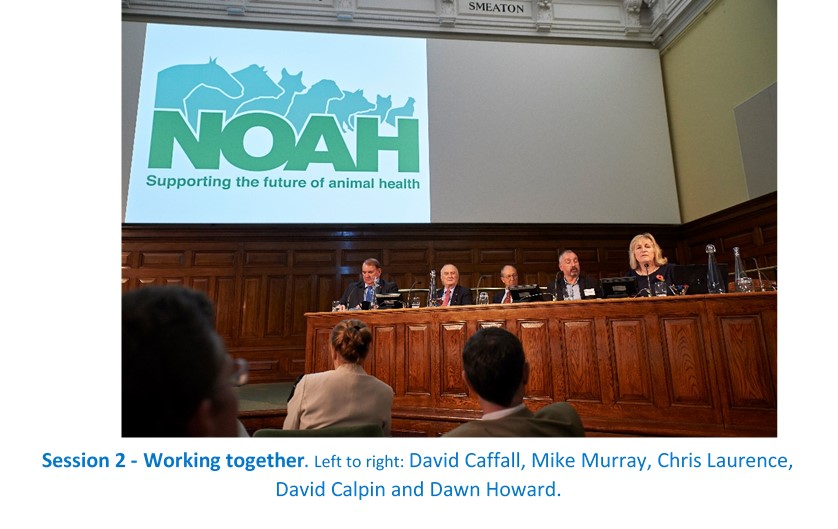



Brexit – what’s the future for animal health? Part 3
MINI SERIES part 3 – Working together. David Caffall, Mike Murray, Chris Laurence and David Calpin discuss how delegates can work together to ensure that the animal health sector gets the best deal out of Brexit.Working together
 David Caffall, Chief Executive AIC and Chair of the Agri-Brexit Coalition, spoke from the supply-industry perspective of the Agri-Brexit Coalition. He described why the Agri-Brexit Coalition was formed and how it will help important issues, voiced by farmers, get to national policy makers:
David Caffall, Chief Executive AIC and Chair of the Agri-Brexit Coalition, spoke from the supply-industry perspective of the Agri-Brexit Coalition. He described why the Agri-Brexit Coalition was formed and how it will help important issues, voiced by farmers, get to national policy makers:
There is absolutely no point in producing erudite, well-researched, well-written policy documents if they don’t get to the attention of the people who are actually going to make the decisions. It needs to meet the objective and get the job done… and sell at the ‘top tables’. It is hoped that Agri-Brexit Coalition can act as a springboard for this.
He concluded by explaining his belief in the value of creating clear strategies by sector – pig, poultry, sheep etc. – to ensure post-Brexit agricultural policy is what we want it to be.
Mike Murray, Head of Quality and Environmental Standards, ABPI and member of the Life Sciences Coalition highlighted the four key priorities for managing the issues being faced by the life sciences industry:
- Regulation – saving the framework we have right now.
- Trade – maintaining ease of trade and security of current import/export relationships
- Research and Development – maintaining access to high quality equipment to provide world-class research. Ensuring tight collaboration with EU research links. Maintaining intellectual property security.
- EU workforce – retaining and engaging the best staff we can.
Murray spoke of the importance of addressing UK government on key issues, but also stressed the critical nature of ‘getting our message across’ to the EU and its member states in recognition of the two-way process we are in.
Chris Laurence, Chair for the Canine and Feline Sector Group (CFSG) spoke of CFSG’s work with Defra on developing new animal health sector regulations and described the potential to move forward with animal health and welfare standards once we free from EU restrictions.
CFSG have been working with Defra on writing new regulations – what should go into a particular regulation and what guidance should be provided with such regulations. Currently, Defra and the CFSG are reviewing outdated animal activity licensing regarding certain animal welfare activities, of which the review will hopefully reach Parliament by January 2018. Again, both the opportunities and the risks of changing legislation under Brexit were discussed; Laurence drew attention to article 13 of the Treaty of Lisbon, where animals are explicitly recognised as sentient beings, as the risks of losing this are very real. On the other hand, EU restrictions on treating ticks has caused an influx of tick-borne diseases in the UK, so ‘breaking free of the shackles of the EU’ would allow new legislation to develop around controlling issues such as this.
David Calpin, Chief Executive at BVA stood in for Gudrun Ravetz, Senior Vice President, and followed on a recurring theme of the day: the importance of having access to a skilled workforce, in order to maintain the standards we have now within the animal health sector.
The Veterinary Capability and Capacity Project (VCCP), an initiative from Defra, sees collaboration of key stakeholders, including the BVA and Royal College of Veterinary Surgeons, to ensure that the UK has enough vets to meet its needs in the future. Calpin pointed out:
Recent figures show that over half of vets, newly registered to begin practising in the UK, come from overseas.
As many as 95% of vets working in UK slaughterhouses are from other EU member states.
It is in our best interest to work hard to recruit and retain UK vets.
The BVA Brexit Working Group published their Brexit report in May this year, a collaborative project that has drawn on the wider knowledge and expertise of veterinary professionals, specialist divisions of veterinary associations, and industry partners and stakeholders. 52 recommendations were set out in the report which included retaining subsidies and rewards for good management practices regarding animal health and welfare on farms.
BVA, the RCBS and other veterinary associations are also active members of the Federation of Veterinarians in Europe (FVE) which is currently developing a joint policy plea to the European Commission and to member states calling upon the use of common sense when addressing issues surrounding access to veterinary medicines. This is expected to be approved next week at FVE’s General Assembly.
Look out for part 4 of the ‘Brexit: what’s the future for animal health?’ MINI SERIES
The Pig Site Editor









